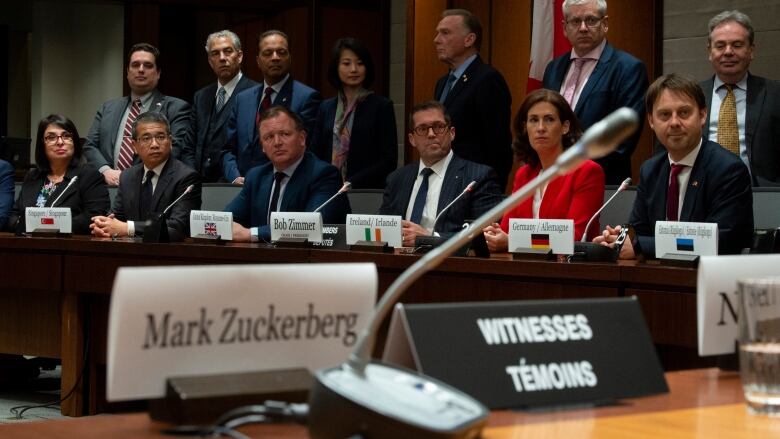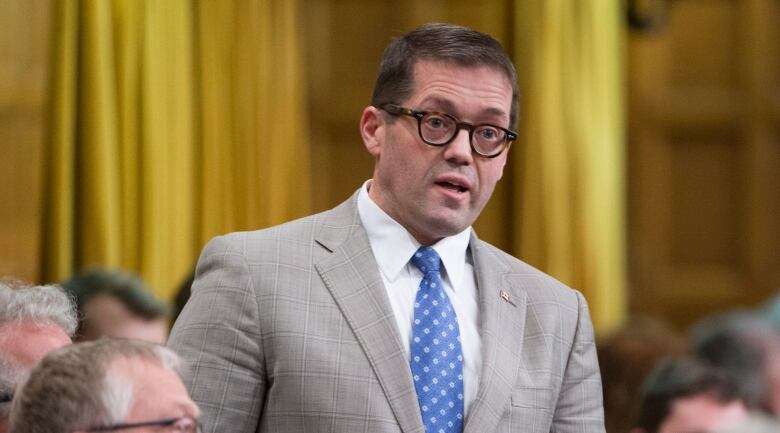Ottawa hearings show there's political will to regulate big tech but will it spur change?
'Perhaps this is the beginning of the public consciousness that we need,' says reporter Murad Hemmadi

This week's International Grand Committee on big data, privacy and democracy didn't end with regulation for social media companies, but one tech journalist says the international cooperation is a sign that momentum is building.
Over three days of hearings, MPs from 12 countries met with representatives from Google, Facebook and Twitter, among others. The Silicon Valley representatives were asked to defend their companies' records on protecting users' data and, crucially, democracy.
Despite a subpeona, Facebook founder Mark Zuckerberg and the company's COO Sheryl Sandberg were no-shows.
On Tuesday, Conservative MP and committee chair Bob Zimmer issued a second summons and suggested the pair would be held in contempt of Parliament if they don't appear before the committee the next time they enter Canada.
Murad Hemmadi, a tech and policy reporter for the Logic, was in Ottawa for the meetings.

He told Day 6 host Brent Bambury that lawmakers' shared frustrations this week reflect a widespread resolve to regulate big tech although concrete action likely won't come any time soon.
Here's part of that conversation.
We just heard one tense exchange from this week's hearings in Ottawa. How much animosity was there in that chamber where the meetings took place?
While the tech companies were testifying, I'd say there was quite a lot. We had representatives from Facebook really put through the wringer on Tuesday afternoon.
I think of one particularly tense exchange between Damian Collins, who is the co-chair of the committee and a British MP, and Neil Potts, who is one of the Facebook people there, over this doctored video that some of your listeners may have seen of Nancy Pelosi.
There was a willingness to interrupt;a willingness to try and drive home the point. Liberal MP Nathaniel Erskine-Smith, who I'll mention here as a lawyer because it really came out during these proceedings, [was] really trying to drive home with all of these company representatives whether it was Facebook or Apple, Microsoft 'I want yes or no answers to questions.'
And from the tech companies perspective, I get it. They've got policies to try and explain, they're trying to explain how they sort of see the world.
But, really, ethics committee chair Bob Zimmer a man who's certainly not given to rudeness, not given to displays of extreme emotion [was] sounding quite annoyed, honestly, with Amazon on Wednesday.
That [second] summons got headlines across the world. Perhaps this is the beginning of the public consciousness that we need to actually see regulation.- Murad Hemmadi, the Logic
The fact that there was a determination from the committee members to actually get the questioning right how different did that make these hearings from the questioning that Mark Zuckerberg faced in the U.S. Senate last year when he appeared?
Oh, hugely different. At that hearing, we heard people asking ... really basic questions about how these companies work. I remember a senator asking how Facebook makes money. And Mark Zuckerberg's response, which I think has become a bit of a meme, was 'Senator, we sell advertising.'
No such lack of basic knowledge at the committee [this week]. Very pointed questions about business models ... in fact on the Amazon day, the committee members seemed to know more than the executives of the companies themselves.
This is an international committee. It wasn't just Canadian MPs. There are lawmakers from 12 countries represented here, and they obviously knew what they were there to talk about. Why was it such a low priority for Mr. Zuckerberg and his fellow CEOs?
I think because these 12 countries' worth of lawmakers can't really swing the hammer at Facebook and these other tech companies whose executives chose not to come.
There were no U.S. representatives on the panel, though my understanding is that they had expressed some interest. But that's really where these companies are based, and that's who might be best placed to effectively regulate them.
Then what was the biggest thing that you took away from watching these MPs from 12 different countries as they interrogated officials from Amazon and Google and Facebook about their practices?
I think we saw, as you said off the top, a willingness to regulate and what will become really interesting is how much coordination there is as these different countries come to set rules.
The tech companies said off the top that they're open regulation; that they want good regulation, that they want good rules.
But then when it came down to talking about specific kinds of regulation for example, competition, anti-trust, which I know is not the most exciting of topics to most people, they could not express opinions.
These 12 countries signed a declaration on Tuesday, a declaration to continue to examine these issues. The question to me is: What will the prime ministers and presidents and rulingadministrations of these countries decide to do?
So the declaration commits to further study but does it do anything at all when it comes to moving forward with regulation?
No, but they did indicate that they're hoping to come to specific suggestions and recommendations. These conversations, they made clear, don't stop between meetings.
These lawmakers are in touch fairly regularly. And I think as you see some of this regulation start to take shape, we might see some influence across countries.
And I think the odds of that might actually be increased by the fact that many of the delegations that came, and certainly the Canadian component of this, is truly cross-partisan.
That suggests to me that this might not be as dependent on who gets elected next time out than perhaps might otherwise be the case.

What do you think it would take for Canadian politicians to move beyond what you've identified as a 'will to regulate' and actually take concrete steps to address some of the problems that they highlighted this week?
I don't think we're going to see anything until the election, certainly. Part of the problem is that these issues can be a little esoteric to the public.
And the best example of this is the digital charter that the current government, the Liberal government, released last week which has some very, very high-level principles in it including the promise that they're going to take strong enforcement action.
The question to me is: What will the prime ministers and presidents and gruelling administrations of these countries decide to do?- Murad Hemmadi, the Logic
But at the same time then yesterday, a few blocks over [from the committee hearings] and a few hours later, the prime minister at a different summit repeated the line that that they've taken frequently which is that they want the tech companies to do this themselves. And they will regulate if they do not.
The 'if they do not' has been coming since at least 2017, so I think it will take far more attention from the public and perhaps that is the takeaway from this week.
The summons that the ethics committee issued to Mr. Zuckerberg and Ms. Sandberg, it has fairly limited practical application. But that summons got headlines across the world.
Perhaps this is the beginning of the public consciousness that we need to actually see regulation.
This transcript has been edited length and clarity. To hear the full interview with Murad Hemmadi, download our podcast or click 'Listen' above.












_(720p).jpg)


 OFFICIAL HD MUSIC VIDEO.jpg)
.jpg)



























































































